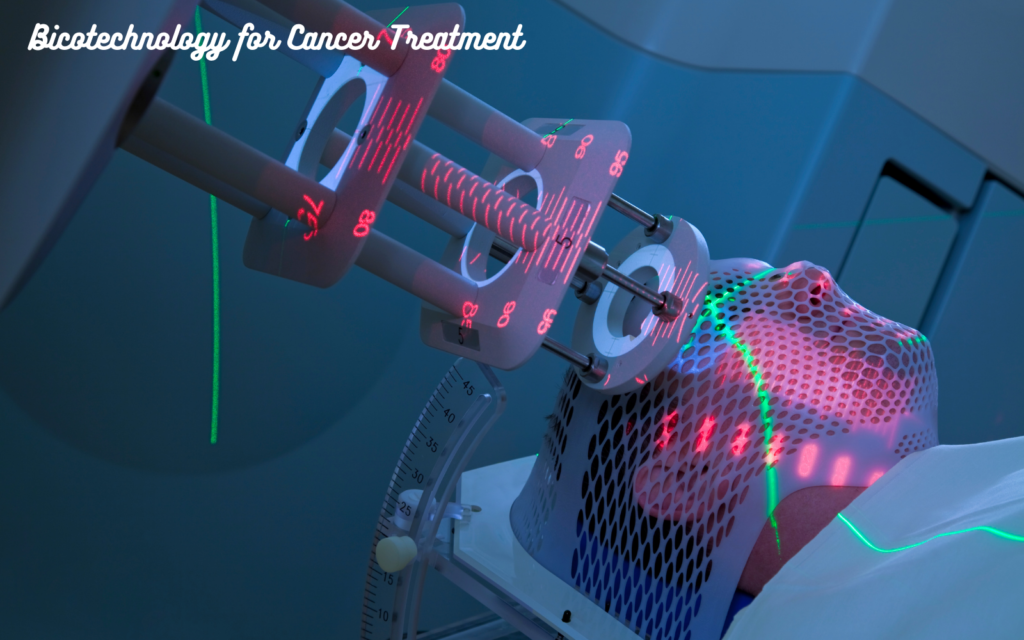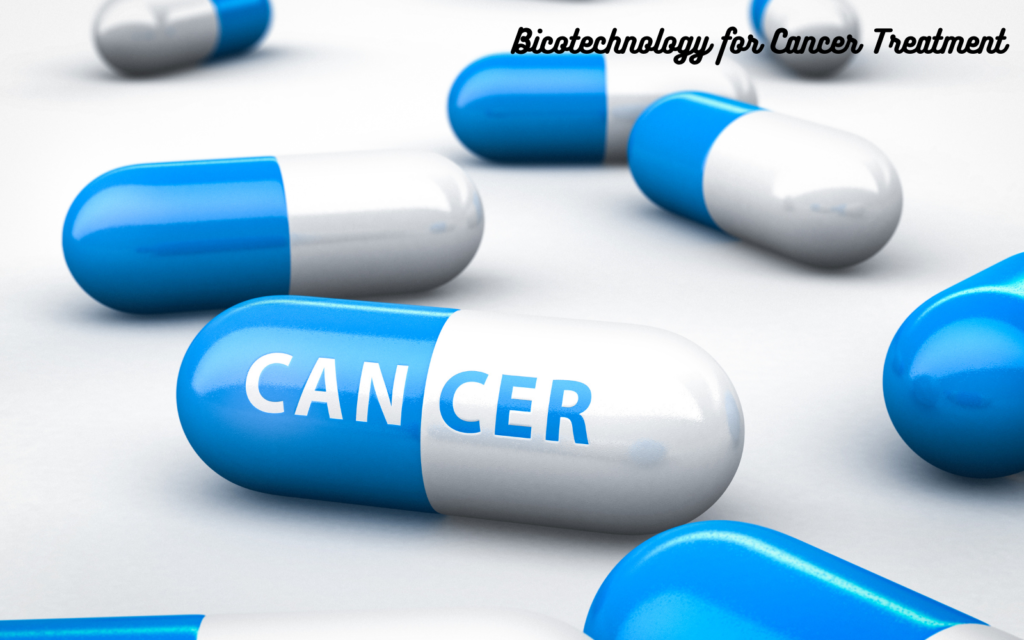Introduction: Biotechnology for Cancer Treatment: Hope for a Cure

Hope for a Cure discusses promising cancer treatments using biotechnology. Biotechnology creates goods and methods to diagnose and treat diseases like cancer utilizing living organisms, cells, or biological systems. Biotechnology has created targeted medicines, immunotherapies, and personalized medicine to improve cancer treatment outcomes and patient survival. Researchers are always looking for innovative ways to use biotechnology to study cancer biology, create novel treatments, and find a cure.
Table of Contents
Exploration of the advancements in biotechnology targeting cancer treatment.
Cancer biotechnology is always evolving due to discoveries and innovations. Researchers and doctors are discovering novel cancer treatments using cutting-edge biotechnological methods. Biotechnology is changing cancer diagnosis, treatment, and management via genetic sequencing, targeted medicines, immunotherapies, and customized medicine.
Emergence of new therapies offering hope to patients and the medical community:
These novel medicines give patients and doctors hope. These novel cancer treatments may improve patient outcomes, survival rates, and side effects compared to chemotherapy and radiation. The advancement of biotechnology-driven cancer research offers new ways to treat this difficult disease, giving hope for the future.

Biotechnology utilizes living organisms and biological systems in developing cancer treatment approaches:
Biotechnology for cancer treatment uses living organisms and biological processes to produce new cancer treatments. Cells, proteins, and genetic material can be manipulated to generate targeted medicines that kill cancer cells without harming healthy ones. Biotechnology allows researchers to create more accurate and effective cancer treatments, improving patient outcomes. This method offers a more customized treatment that is becoming more common in cancer care.
Development of treatments that specifically attack cancer cells:
Specialized cancer treatments using biotechnology target cancer cells while protecting healthy tissue. Advanced biotechnology can identify cancer cells’ specific traits, such as genetic mutations or protein markers, that set them apart from normal cells. Researchers can build medicines that selectively block cancer cell growth and spread by focusing on these traits, improving treatment outcomes.
Use of monoclonal antibodies and small-molecule inhibitors.
Monoclonal antibodies and small-molecule inhibitors are crucial to targeted therapy. Monoclonal antibodies, lab-made molecules, attach to cancer cell antigens to designate them for immune system destruction or directly interfere with their function. However, small-molecule inhibitors impede molecules or signaling pathways essential for cancer cell survival and growth. These biotechnological technologies allow clinicians to customize cancer treatment based on molecular traits, making it more precise and effective.

Biotechnology enables targeted therapies tailored to individual patient profiles:
Biotechnology is essential for cancer treatment’s personalized targeted medicines. Genetic testing and precision medicine can help doctors find cancer cell genetic abnormalities or biomarkers. This allows the creation of cancer treatments that target the patient’s unique traits while minimizing adverse effects on healthy tissues. Biotechnology allows patients to receive individualized medicine therapies with increased efficacy and better outcomes, advancing cancer care.
Modifying genetic makeup to treat or prevent cancer:
Biotechnology for cancer care changes genes to treat or stop cancer. This state-of-the-art method fixes DNA changes that cause cancer and adds genes that help the body fight cancer.
Researchers can target and modify cancer-related genes using gene editing and gene therapy, enabling tailored and precise cancer treatment.
Correction of genetic mutations and insertion of genes to enhance cancer-fighting capability.
Correcting genetic mutations is essential for treating cancer-causing genetic diseases. Using genome editing tools like CRISPR-Cas9, researchers can fix these mutations and lower the chance of cancer.
Additionally, inserting genes that boost the body’s natural defense mechanisms against cancer, like as immunological responses or cancer cell death, can improve therapy results and efficacy.
Through “biotechnology for cancer Treatment”, modified genetics, researchers hope to produce personalized and effective cancer treatments that address genetic reasons. This method could advance precision medicine in cancer care and spur the discovery of innovative treatments that could change cancer treatment.
Immunotherapies, a form of biotechnology, harness the immune system to fight cancer cells:
Biotechnology immunotherapies use the immune system to fight cancer cells. This method stimulates the immune system to attack cancer cells as invaders. Immunotherapy treatments like checkpoint inhibitors, CAR-T cell therapy, and cancer medicines that target and kill cancer cells have been made possible by biotechnology. Researchers and physicians are giving cancer patients alternatives to chemotherapy and radiation by using biotechnology in immunotherapy. This novel strategy could improve cancer outcomes by offering tailored and potentially more effective”biotechnology for cancer treatment” alternatives.
Harnessing the patient’s immune system to combat cancer:
Immunotherapy is a “biotechnology for cancer treatment” that uses the patient’s immune system. This method boosts the body’s natural defenses to detect and kill cancer cells. Researchers can boost the immune response to cancer with biotech tools including immune checkpoint inhibitors, CAR-T cell therapy, and cancer vaccines, improving treatment results and long-term remission.
Techniques include checkpoint inhibitors, CAR-T cell therapy, and cancer vaccines:
Checkpoint inhibitors assist the immune system to locate and attack cancer cells that may have evaded detection. By changing a person’s genes so that their T cells can find and kill cancer cells, CAR-T cell therapy is a very specific and effective way to treat cancer. However, cancer vaccinations teach the immune system to recognize cancer antigens and fight cancer cells.
Healthcare professionals can provide patients promising cancer treatments using biotechnology-based immunotherapeutic methods. This tailored and revolutionary cancer treatment could revolutionize cancer care and improve patient outcomes.
Personalized medicine in cancer treatment is advanced through biotechnological innovations:
Advanced biotechnology has made and using “Biotechnology for cancer treatment” more customized by adapting medicines to patients’ genetics, lifestyle, and illness features. Biotechnology like genomic sequencing, biomarker analysis, and molecular diagnostics help pinpoint cancer cell molecular targets. This individualized approach allows for patient-specific treatment options, boosting therapeutic success and reducing side effects.
Biotechnological technologies help clinicians predict patient responses to different medicines, enabling them to make better treatment decisions. This personalized approach to cancer care may improve patient outcomes, reduce treatment resistance, and improve quality of life.

Engineering nanoparticles to deliver drugs directly to cancer cells:
Nanoparticles are engineered to deliver medications directly to cancer cells, improving therapy efficacy while avoiding tissue harm. Nanoparticles can encapsulate and transport cancer-fighting medications to tumor locations. Researchers can Utilize “Biotechnology for cancer treatment” by surface-modifying or ligand-targeting these nanoparticles.
Improved treatment efficacy and minimized damage to healthy tissues:
In cancer treatment, nanoparticle drug delivery methods have many benefits. Nanoparticles target cancer cells, reducing drug exposure to healthy organs and adverse effects. By increasing drug concentration at the tumor site, this tailored strategy improves therapy efficacy. Nanoparticle-based medication delivery devices can also cross biological barriers like the blood-brain barrier, treating hitherto inaccessible malignancies.
Researchers want to transform cancer treatment by optimizing drug delivery and patient outcomes via nanoparticle engineering biotechnology. Nanoparticle-based medicines can target cancer cells while protecting healthy tissues, improving cancer treatment efficacy and lowering adverse effects.
Ongoing research aims to leverage biotechnology for deeper insights into cancer biology and more effective treatment strategies:
Biotechnology research tries to understand cancer’s intricate biology and produce better treatments. Researchers can study the genetic, molecular, and cellular mechanisms of cancer formation, progression, and treatment utilizing biotechnology. This molecular understanding of cancer biology is essential for finding new therapeutic targets, predicting therapy results, and creating tailored treatment plans.
High-throughput sequencing, bioinformatics, and genome editing technologies like CRISPR-Cas9 can reveal cancer-specific biomarkers, pathways, and molecular fingerprints. These findings advance cancer biology and enable the creation of more effective and safer targeted treatments, immunotherapies, and combination treatment regimens. Using “biotechnology for cancer Treatment” research aims to improve treatment outcomes, survival rates, and ultimately find a cure
Precise alterations in DNA using CRISPR-Cas9 and other genome editing technologies:
“Biotechnology for cancer treatment” uses CRISPR-Cas9 and other genome editing tools to precisely modify DNA. Researcher can target specific genes associated with cancer development to fix genetic mutations and boost the body’s immunological response to malignant cells. Healthcare professionals can change cancer therapy by tailoring genetic interventions with genome editing.
Correcting cancer-causing genetic mutations and editing immune cells for better targeting:
In particular, CRISPR-Cas9 can modify DNA sequences with unparalleled precision. Researchers can target and edit cancer-promoting genes using CRISPR technology to stop tumor development or make cancer cells more treatable. Genome editing can edit immune cells like T cells to target cancer in addition to repairing genetic abnormalities in cancer cells.
Healthcare professionals want to produce individualized and effective “Biotechnology for cancer treatment” using genome editing biotechnology. Genome editing technologies can improve cancer patient outcomes by fixing genetic errors and boosting the immune system’s ability to find and destroy cancer cells.
Conclusion:
In conclusion, biotechnology revolutionizes cancer treatment by providing new ways to fight this difficult disease. Biotechnology has increased cancer therapy precision, efficacy, and personalization by using living organisms and biological systems and generating targeted medicines and immunotherapies. Biotechnological advancements, patient profiling, and using the immune system to fight cancer cells can help healthcare practitioners give more effective and less hazardous treatments.
Ongoing research uses technologies to gain deeper insights into cancer biology, leading to better treatment strategies and molecular knowledge. Scientists hope to develop new therapeutic targets, predictive biomarkers, and novel treatment modalities to improve patient outcomes and find a cancer cure by investigating biotechnology and cancer treatment. Biotechnology has great potential to improve cancer treatment and change the landscape.
Transformation of cancer treatment through biotechnological advancements:
Biotechnology for cancer treatment is changing how we fight this complex disease. Biotechnology helps cancer treatments become more accurate, tailored, and effective. Researchers and healthcare practitioners can use genetic sequencing, targeted therapeutics, immunotherapies, and gene editing to create cancer-focused treatments that minimize tissue damage.
Enhanced research opportunities and renewed hope for effective cures:
Biotechnology has transformed cancer treatment and increased research opportunities to understand cancer biology and generate new medicines. Scientific advances in biotechnology are revealing new therapeutic targets, complex biological pathways, and novel treatment methods that give promise for effective cancer therapies.
Through collaboration between academics, doctors, and biotechnologists, cancer therapy is shifting toward more precise, patient-centered care. Biotechnology and cancer therapy synergy improves treatment results and survival rates and inspires optimism and desire to find a solution. Biotechnological cancer research offers hope for a manageable and possibly curative future.
People Also Ask:
Targeted medicines, immunotherapy, CRISPR gene editing, proton beam therapy, AI-driven diagnostics, personalized medicine, CAR-T cell therapy, and enhanced imaging are cancer treatment developments. These advancements increase precision, side effects, and treatment outcomes, making cancer care more effective and personalized.
New cancer biotechnology includes CRISPR-based gene editing and CAR-T cell therapy, which target cancer cells selectively. These advancements improve cancer therapy efficacy and specificity by offering individualized options.
Pingback: The Power of Biotechnology From Healthcare to Sustainability
I don’t think the title of your article matches the content lol. Just kidding, mainly because I had some doubts after reading the article.